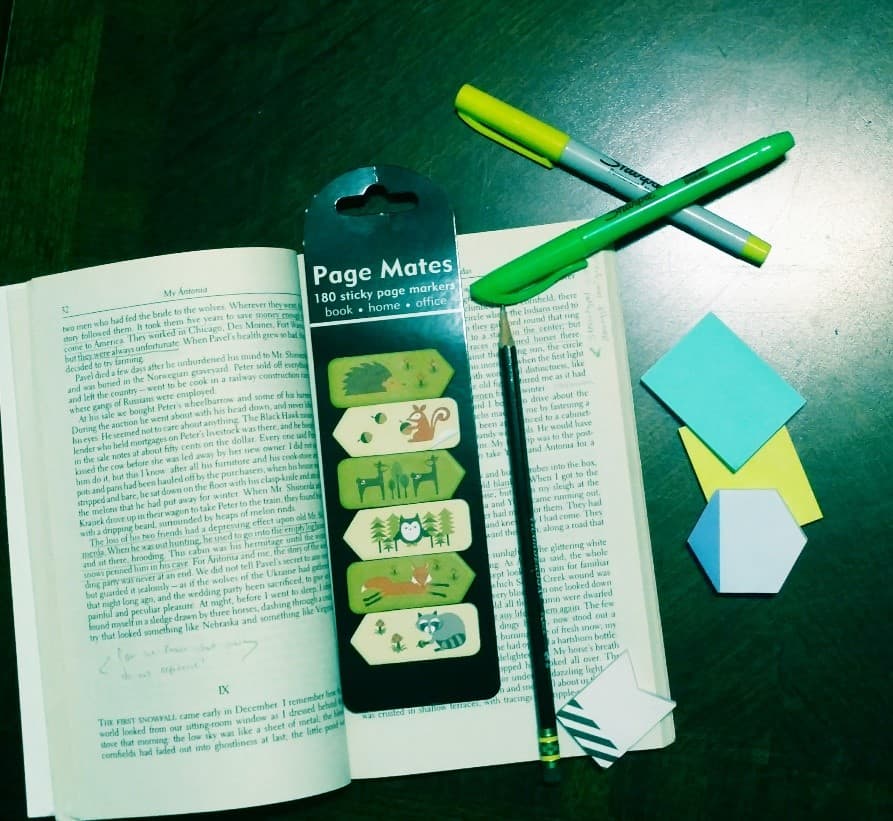Pros and Cons of Annotating Tools
I grew up in an educational environment where writing in books was discouraged; thankfully, my parents had a different mindset and allowed me to annotate in my books from an early age. I credit this practice for instilling a love for reading and a fascination for story-telling within me; yes, it really is that important.
If you’ve taken English courses with Excelsior, you’ve surely heard that annotation is the key to both comprehending and analyzing literature. If you are interested in reading the why behind annotating, take a look at this blog by another Excelsior instructor, Mrs. Jenny Cutler.
If you’ve already bought into the idea of annotating, but you aren’t sure which “tools” are right for you, keep reading.
5 Tools for Annotating (with some bonus pros and cons):
 Like to stick to the basics? Use a pencil. This one is my absolute favorite. Look inside any of my books, and you are bound to find underlined passages, identification of literary devices and context, questions, and observations written in the margins. Of course, this does leave your copy looking a bit cluttered, and some people find it difficult to flip back through and locate a passage or question because lead is light and doesn’t draw immediate attention.
Like to stick to the basics? Use a pencil. This one is my absolute favorite. Look inside any of my books, and you are bound to find underlined passages, identification of literary devices and context, questions, and observations written in the margins. Of course, this does leave your copy looking a bit cluttered, and some people find it difficult to flip back through and locate a passage or question because lead is light and doesn’t draw immediate attention.- Feel you need something that stands out? Use a highlighter! Many people use highlighters because the ink easily draws attention. I even know some very organized annotators who color-code their work (green for literary devices, yellow for important passages, and so on). I personally find highlighters distracting because of the vibrant color and the fact that they can bleed through pages. For those who like this idea but don’t want to deal with bleed-through, try twist-stick crayons. They are brilliant.
- Can’t stomach the idea of writing in your books? That’s ok! Post-it notes can also be used; they come in a variety of sizes and colors, which makes their use easy. Find a passage that points towards theme? Label a note and stick it on the page. The downside to this one is that post-its are not permanently in place…although I suppose some would see that as a pro.
- Looking for something more stable? Use a notebook. Notebooks can be handy for individuals who do not want to write in their books, but who are interested in reaping the benefits of annotating. As an added bonus, notebooks give readers flexibility in organization. You can set aside a few pages for literary devices, a few for significant passages, a few for important social/historical context, a section for reflection and questions, etc. As Mrs. Cutler mentioned in an earlier blog, make sure you note the page number so that you can easily locate it if needed.
- Wait! I’m an e-reader. No problem! Some devices have built in annotating tools, but for those that don’t, you can always download annotating apps. And if that seems too confusing, I know someone who simply snaps screenshots and then organizes those into folders (probably not the most time efficient suggestion, but it works for her).
Most importantly, play around with it and see what works best for you. We are all wired differently, and the more familiar you become with the practice of annotating, the easier it will be to slip into your own note-taking groove.
Helpful Links:
This article discusses annotating techniques for the struggling reader.
This article discusses annotation for e-readers.
About the Author
Jess Woods graduated from Indiana University with a Bachelor's degree in English Education and from Arizona State University with a Master's degree in English. She began her career teaching in a public high school; however, since 2013, she has been teaching middle school and high school English courses online. Jess is a life-long reader and writer. She comes alive in the company of words and music, and she has a passion for literature that reaches through every part of her being. She believes wholeheartedly that each person has a relevant voice and perspective, and she eagerly teaches her students to embrace their individual voices by exploring their own thoughts and learning to confidently articulate them. It is her desire to encourage growth in all students (regardless of their love for English courses…or lack thereof). She considers it a tremendous success if she can awaken a love of literature and/or composition in her students. Jess currently resides in Alabama with her pastor-husband, Josh and their three kids. They also have a lot of animals and plants. While reading and writing are clearly on the top of her hobby list, Jess also enjoys all things musical, cooking competition shows, gardening, hiking, and traveling.





